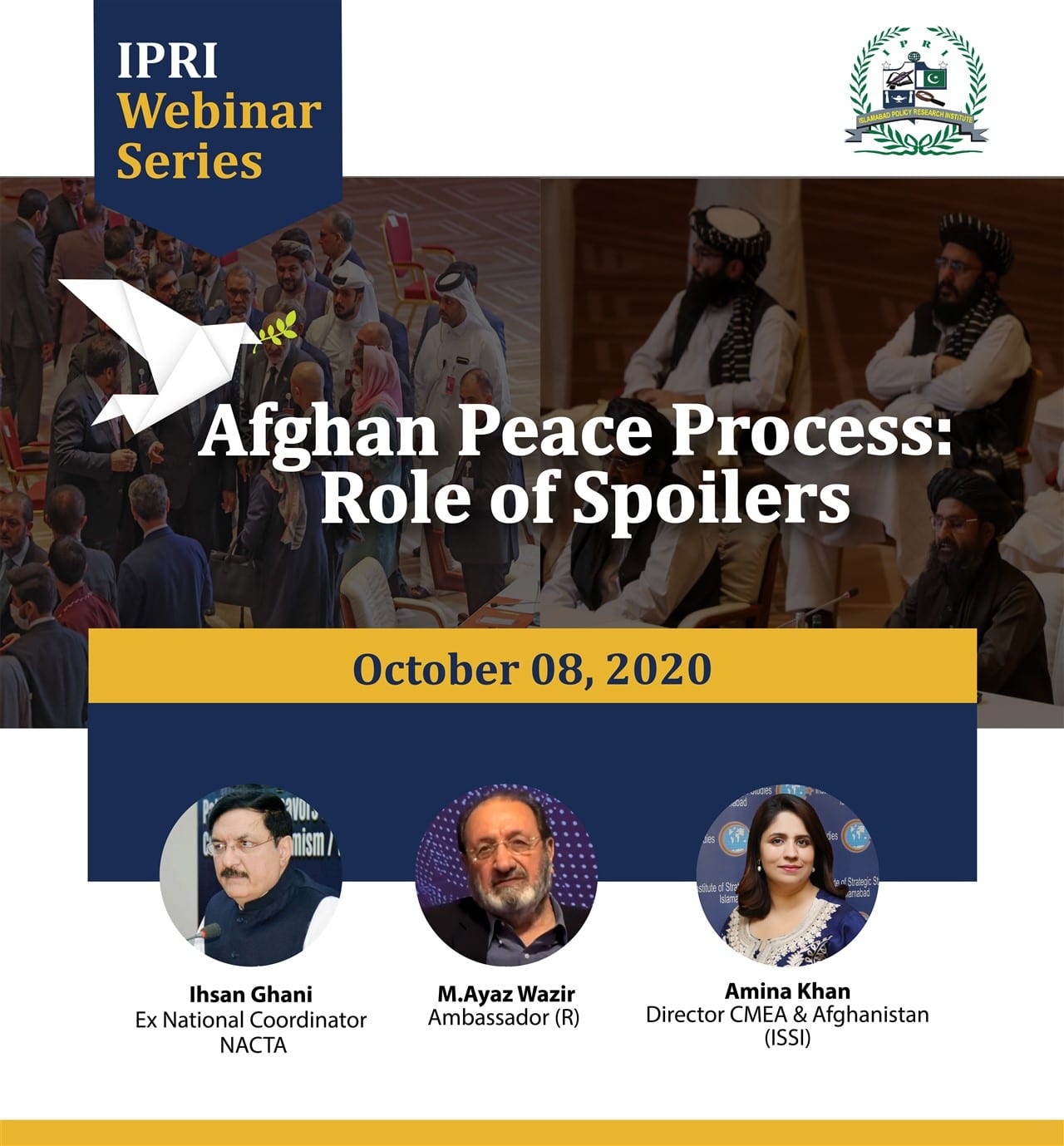Conference / Seminar / Webinar 08/10/2020

General
Islamabad Policy Research Institute (IPRI) organized a webinar on the “Afghan Peace Process: Role of Spoilers” on October 8, 2020. The distinguished panelists, invited to deliberate and provide their expert input on the subject, included Mr. Ihsan Ghani, Former DG IB & Ex-National Coordinator NACTA, who spoke on “Indian RAW and Afghan National Directorate of Security’s (NDS) Influence on the Afghan Peace Process;” Ms. Amina Khan, Director CMEA & Afghanistan, Institute of Strategic Studies Islamabad (ISSI), spoke on the topic, “How India can Sabotage the Dialogue Process through the Afghan Factions?” and Ambassador (R) Ayaz Wazir spoke on “How instability in Afghanistan serves Indian interests?” Brigadier (R) Raashid Wali Janjua, Acting President IPRI and Director Research, commenced and concluded the webinar with a welcome address and vote of thanks, respectively. Organized on Zoom, the webinar was structured to analyse the role of spoilers in the Afghan peace process. A lively discussion/Q&A session followed the presentations and, finally, proposing a host of policy recommendations.
Concept Note
While Doha Peace Process between the US and the Taliban has laid the foundations of a dialogue for reconciliation in war-torn Afghanistan, India is trying to delay and scuttle the peace process. Since 2011, India has considerably increased its influence through economic and military assistance with approximately US$ 3 billion in Afghanistan, though it has failed to take a dominant position in recent Afghan Peace talks to achieve its strategic interests. Despite Indian token online participation in Intra-Afghan negotiations, Indian media continues to spit venom against Taliban and its leadership. India is upset because the withdrawal of the US troops will cause a dent in the Indian bargaining power and influence within Afghan power corridors. India’s consulates in Kandahar and Jalalabad are serving as bases for espionage activities against Pakistan. Moreover, Tehreek-i-Taliban Pakistan (TTP) and Baloch dissidents have been supported by India by using the Afghan territory.
Key Takeaways
In the light of views expressed by the speakers and discussion, following takeaways emerge:-
- Economic interdependence will help in disabling pockets of terrorist elements in the region by improving living conditions and enabling constructive cooperation. CPEC is one such initiative that, if expanded to Afghanistan and Central Asia, will benefit Afghan economy.
- Pakistan’s security forces and intelligence agencies need to remain vigilant of increase in cross border terrorist activities. Despite peace overtures in Afghanistan, India will ensure that its 19-year investment may not go waste including its efforts to destabilize Pakistan.
- Simultaneous to the peace process in Afghanistan, Pakistan ought to focus on internal sources of conflict and divide, to present a unified front to external hostile actors.
- In the post withdrawal period, a regional framework comprising Pakistan, China, Russia, Iran and Central Asian states may deal with issues such as cross-border terrorism, security and drug trafficking.
- Pakistan and regional stakeholders should support all efforts for bringing peace and reconciliation in Afghanistan that will preserve unity and plurality as well as bring security, stability and prosperity to the country. After all, peace in Afghanistan would translate into peace and progress in the region.
- Having suffered heavily due to foreign intervention, internal wars and the war against terrorism, the current Afghan government has to realize that Afghan people need peace and development. For this objective to achieve, it is necessary that the Afghan government should lay maximum emphasis on national reconciliation through peace talks among all ethnic groups in Afghanistan.
